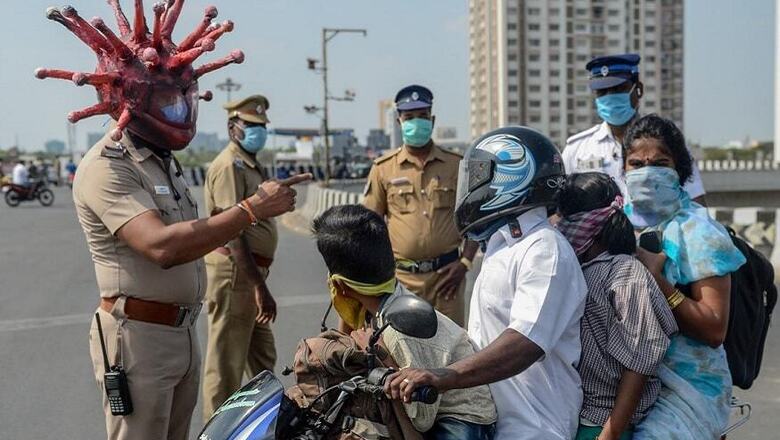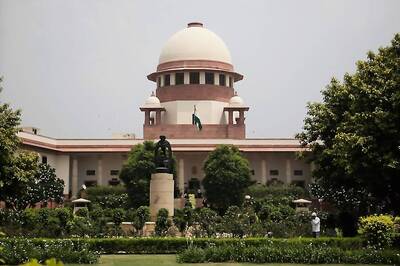
views
Tamil Nadu, after earlier appearing to have managed to curb the spread of the coronavirus, is turning into a hot-bed of the disease, with more than 3,000 cases being reported from the state. The spike in cases has largely been from Chennai, which accounts for nearly half of all the cases in the state.
The state capital is the worst-hit, with close to 1,500 cases as of Sunday. While the numbers in Chennai have soared in recent weeks, the other districts in the state have seen a gradual reduction.
Among the districts that have shown a steady improvement is Coimbatore. And the largest city of the state now has some lessons for Chennai on how it can handle the crisis.
Like Chennai, Coimbatore, too, was severely affected by a cluster outbreak after the return of attendees from the Tablighi Jamaat congregation in Delhi. But authorities said the returnees cooperated during the tracing and testing process and the situation is now under control.
As a result, only one case has been recorded in the last 10 days. While the overall positive cases in the district stands at 146, only 11 were active as on Sunday evening. However, there remain concerns on whether the city is testing enough people.
So how did the district administration flatten the curve? What are the challenges ahead? News 18 caught up with Coimbatore district collector, K Rajamani, to find out about the fight against Covid-19.
Q. How has Coimbatore managed to reduce active cases after the initial spike?
A. We acted fast. The first case in Coimbatore was from Spain. On March 25, we received the list of people who had visited the Tablighi Jamaat conference. On 26th night, we traced around 90 per cent of the passengers who came back from Delhi. By 27th, we had them tested and found out that 50 per cent were positive. We identified the remaining missing people in the next one-two days. All their family members (194) were identified and tested within two days. 60 persons tested positive. In the next four-five days, we traced the secondary contacts, 719 of them. Fortunately, there were only 2-3 of them who were positive.
Importantly, even the ones who tested negative weren't allowed to return home. We had them under institutional quarantine in lodges and schools, and they were allowed home only after 14 days. Simultaneously, we identified 18 areas associated with them and sealed them completely. Health, local body, revenue and police departments worked together jointly.
Coimbatore is very close to Kerala, which had a lot of cases initially. Even before the government announced sealing of state borders, Coimbatore kept plenty of check posts to ensure people didn't move in to the district.
Q. What has Coimbatore done differently than Chennai? Has the public been more cooperative?
A. Apart from the Delhi cluster, Chennai would have had a lot of people coming from all over the world. All of them should have been quarantined strictly. Coimbatore quarantined 4,850 people who travelled in from abroad. One or two of them tested positive. Chennai also quarantined people with travel history, but there were loose ends.
Second reason for the spike in Chennai is that sample testing was not done in an organised way. Most importantly, the biggest reason for our success is the health department received cooperation of unexpected levels. Coimbatore health department's performance should be appreciated.
Chennai is a wider area, so coordination between different wings is even more important. They prioritised sanitisation and bought disinfectant tunnels and other such innovations in the first 10 days.
Another major mistake was surveying door-to-door to check whether people had symptoms. Instead of focusing on the target group, they went behind the entire 70-80 lakh population. They lost crucial 15 days and it's reflecting now. The risk is now spreading to other districts.
Coimbatore people have always been supportive during tough times, and that's the case now as well. All government departments are working on war-footing as well.
Q. In a way, has Coimbatore benefited from keeping things simple and focused?
A. I am not against innovation, but personally I felt it wasn't needed at this stage. For example, there was a lot of noise around disinfectant tunnels initially. I was against it from the beginning. Some corporate companies offered to provide tunnels for free. I told them there was no proof that the tunnels work. Setting up a tunnel costs Rs 1.2 lakh; that money could be used to provide food or buy PPEs. However, out of compulsion we had to set up a tunnel in my office itself, although I wasn't for it. Within two days, the government asked everyone to remove the tunnels.
Essential commodities have to be sent, yes. But we didn't move too much in the direction of innovations. Government initially said essentials have to be sent through government bodies, not through private parties. Even ration had to be sent in the form of dry raw materials. But Coimbatore is the biggest town after Chennai. We have to feed 60,000 to 70,000 workers and it would have been a huge task for authorities.
If they don't get food, there was a risk of them coming on the streets which would have created a bigger issue. So we decided to let everyone provide food, asked police not to stop people providing food even if they were private parties. So there were instances where instead of one packet, workers ended up getting two. But that's not a bad thing.
We've handled more than 50,000 people without any issue. Focusing on the simple things was enough for us. There's no need to do things for attracting attention, in these times. We can't say we did everything perfectly. But then, people cooperated and withstood the problems completely.There's nothing alarming in Coimbatore now. Now, we are focusing on people coming in from Chennai, especially Koyambedu. There are also a lot of asymptomatic people, which we have to address.
Q. Coimbatore has a history of communal issues. How has the situation been kept under control, especially after the spike from the Tablighi Jamaat cluster?
A. The Muslims who went to Tablighi Jamaat conference and their families should be appreciated too. In general in Tamil Nadu, they've been supportive. There have been one or two issues in other districts but even that hasn't happened here. Personally, I thought there would be a few challenges in approaching them and getting them tested, but it was all very smooth.
Till the lockdown began, Muslims were protesting against CAA in a couple of places here. We were worried there could be Hindu-Muslim conflicts and held peace talk meetings. But as soon as the lockdown began, they stopped their protests and cooperated completely.
All communities have been very supportive. Both Muslim and Hindu groups have been helping the government, providing food and help to each other till date. Fortunately, there's been no conflict whatsoever.
Q. There is a view that other districts haven't been testing as much as Chennai. The Chennai Corporation said the city has tested 5225 people per million population, while the state average is 1,685 and Coimbatore has tested 1,710 people per million.
A. Coimbatore can test up to 1500 samples per day without any issue, but we should test only those who need to be tested. In four days, we tested 2000 people. Only two-three came positive. Even the 2000 were not randomly tested; we tested neighbours of the 719 secondary contacts I mentioned earlier, because they could be at risk.
I disagree that Chennai is testing a lot. In fact, Chennai's testing numbers aren't enough. Secondly, not many have understood that it's an imported virus. Chennai hasn't tested enough, and tested in a targeted manner. Our strategy has been simple - find the origin, their contacts and the secondary contacts. This is the protocol. You can test 8,000 to 10000 samples, that's not the matter. You should find the target.
Chennai should be testing a lot more given its population. Chennai has all the medical facilities, hospitals. So many more people should be tested. There are five to six risk zones in Chennai. If there's more targeted testing, the spread can be arrested. The 15 days lost has cost Chennai big.
Q. Do you expect complacency to be an issue given the drop in numbers? What are the other challenges for Coimbatore in the coming days?
A. There was a stage where complacency got into people's minds. Since cases were coming down, people thought lockdown would not be extended. I also wondered how people would cooperate if lockdown is extended. But the Chennai episode has stopped that.
Secondly, there are some relaxations to open shops. So people are not completely restless. Thirdly, the migrant workers can also start moving around.
The administration won't be complacent. If we get complacent, then cases will increase again. Once Chennai becomes normal, then we'll be at peace. Till then, we cannot be complacent.
Coimbatore has a natural advantage; people from Chennai are being checked in all districts en route to Coimbatore. But we have also kept our guard and have check posts. There will be some spread, but if we quarantine them, we can control it.
Other districts have a challenge in controlling the spread from Chennai. It's not to fault them, they have a wide population. But other districts have to be alert.

















Comments
0 comment